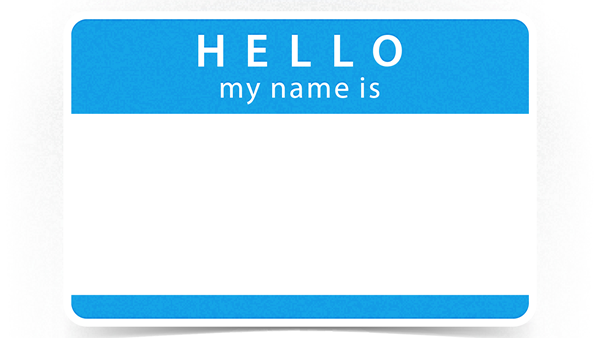ATD Blog
By Any Other Name
Thu Sep 26 2013

You know the quotation: “What's in a name? That which we call a rose by any other name would smell as sweet.” But our brains might process the sensation of smelling that rose differently if we named it something else.
The power of names
Verbal abilities are a relatively recent development for our brains. But once we got the hang of it, we started using names as a shorthand way of retrieving all manner of memories, images, sensations, emotions, and even autonomic physical responses. The Old Testament (Genesis 2:20) says that God brought all the animals to Adam and asked him to name them, and we have been naming our world since then.
Name recognition and self-awareness
Babies learn to respond to their own names at a very early age—perhaps even before birth. But we aren't the only creatures who associate unique meanings to our own names. We have all seen a pet respond to the name provided by their owners, mimicking Adam's process of naming the animals in the Garden of Eden.
But many animals have been shown to use unique signatures when communicating with each other. Parrots and primates name their children. Dolphins and whales also seem to name each other, and remember unique individuals by a specific set of sounds even years after their last encounter with the individual.
So what is happening in the brain when we (and our fellow animals) process our own names? It turns out that the Shakespeare may have gotten this one wrong; a rose by any other name would certainly have the same chemical signature, but our brains would likely assign different associations to the object if we named it differently.
Try it yourself. Picture a rose, but call it a "stink weed" in your head. Here's what is happening: Our brains are made up of specialized cells, called neurons. When these neurons change their electro-chemical state, we experience a brain event, like solving a puzzle or recognizing our own names. After a certain period of time, our names are held in long-term memory for repeated use.
But while a baby is learning, he needs reinforcement to tell the brain to keep this bit of data in long-term memory. And over time, we also associate a rich web of cross-referenced sensations, emotions, and other bits of data into a deep-seated concept of self that is uniquely tied to our name.
We follow a similar process with each and every word we learn, making language the symbolic code that the brain uses to organize conscious thought.
Social and economic impact of names
Consider our own names. Because so much information is coded against a name, that word we use to describe ourselves can have unintended consequences. While parents choose names for their children for mostly personal reasons, their choices reflect society in many subtle ways. In addition, a child's name can have positive or negative effects on social status and income later in life.
What names does your organization use?
By applying this research to the field of human capital management, we can see that the name you assign to an employee can affect the way they feel about the organization, as well as the way that others feel about them.
Take my name for example. I am often assigned an email address using my full first name, "Marjorie," instead of the name I call myself, "Margie." From that point on, my interactions with my co-workers are shaped by their associations with "Marjorie.” However, I feel that I am not being called by the label that symbolizes my understanding of "me."
How hard would it be to let employees exercise this fundamental right of choosing their organization name? Some companies, such as Bank of America and Disney, have chosen to call their employees by more descriptive names. There is a different reaction when we are called "associates," partners," or "characters." These companies are applying sound brain science in choosing theses names carefully.
Indeed, Dale Carnegie recognized the power of a name when he advised readers to learn a man's name and use it frequently if we want to influence him.
To be sure, a rose is a rose is a rose. But by any other name, it would likely be something else altogether.
For more on neuroscience applications for human capital, check out the full blog series here.
